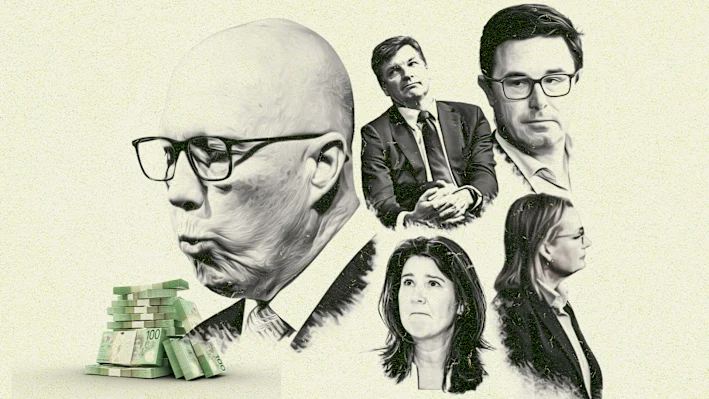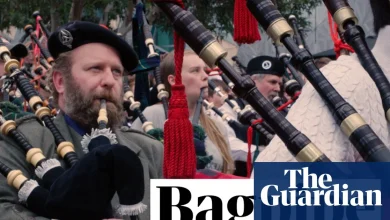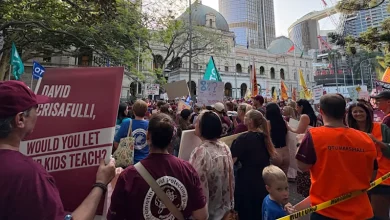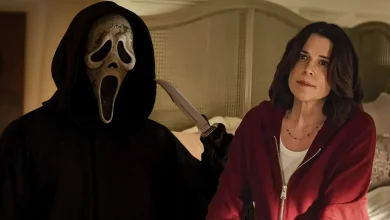‘We were like lemmings going over a cliff’: Inside Dutton’s $17 billion blunder

Albanese did not want to risk either a leak from cabinet or one careless word by ministers or members of their staff in a corridor or at a coffee cart that would even hint there was something else big in the budget. He wanted it kept so quiet that the first the opposition knew about it was in the budget lock-up. Who knows what might happen, Albanese said to his colleagues. It might force the Liberals to make a mistake.
It succeeded, as they would later admit, beyond their wildest dreams.
The opposition’s public decline and fall began in the round of post-budget interviews with the shadow treasurer, Angus Taylor, when he revealed their opposition to the tax cuts. Taylor and Dutton called them a hoax, an insult, because they were only $5 a week.
A pleased PM, as then opposition leader Peter Dutton delivers his budget reply speech on March 27, 2025.Credit: Dominic Lorrimer
Before those public comments by Dutton and Taylor, Coalition MPs were already extremely anxious. A few Nationals had overheard Dutton telling Andrew Hastie in passing in the chamber after Chalmers’ budget speech that they were going to spend the $17 billion tax cuts on defence.
Next morning, Liberal and National MPs went to see David Littleproud to tell him he had to do something. Dutton and Littleproud met later that day to work up an alternative. That was how and when the fuel-tax rebate policy came about. It was a complete, utter shambles.
Until 8.30 on budget night, Labor had simply planned to take the modest cuts as a promise to the election that everyone knew would be announced within days. The Liberals had supported almost every measure Labor had announced since January: $7.2 billion for the Bruce Highway; the $7.9 billion Medicare package to boost bulk billing; another round of energy-bill relief of $150 for every household; and $644 million for 50 additional Medicare urgent-care clinics.
The extra billions were piling up. Dutton had little choice but to adopt whatever Labor announced on health in an effort to neutralise the damage. And the opposition had already committed to producing a healthier budget bottom line, to be more rigorous with savings and more prudent with spending.
It was all part of Albanese’s strategy, thinking ahead to, “Where are we going to end up, where are they going to go.”
“So how do we turn their roads into cul-de-sacs? That is what I say to people literally,” he told me later. No wonder his colleagues say he loves plotting.
Even so, Labor figured that even if the opposition struggled to make their sums add up, and derided the tax cuts as measly, they would still copy or adapt them. They thought they would go to the election saying, “If you vote for us, you will get a tax cut”; or, at the worst, they would have to defend their offer against whatever alternative the Liberals proposed.
If Taylor and the shadow finance minister, Senator Jane Hume, had their way, voters would have been forced to decide between duelling tax cuts. They had gone into the lock-up early, well before Dutton. When they saw the tax cut, they knew they would have to respond to it, so began working up options. The first was simply to accept what the government was offering. They were not enthusiastic about that.
Another was to oppose it outright. They didn’t think that was a good idea, either. The third was to oppose the government’s tax cut, but to make another offer – a tax-back guarantee. With this, something Taylor had previously worked up, if inflation went up higher than 3 per cent, pushing people into a higher tax bracket, the difference between the 3 per cent and the actual inflation rate would be returned as a cut to taxpayers. They argued the beauty of that was if inflation was contained within the Reserve Bank’s target range of between 2 and 3 per cent, there would be no additional outlays.
It seemed like a plan. Until Dutton walked into the lock-up later that afternoon.
Dutton instinctively was not interested in doing anything on tax. He did not think a bigger or different tax cut was the way to go. And he was not enthused – to put it mildly – by Taylor’s idea. Dutton told Taylor and Hume that the Coalition wasn’t going to try to outdo the government’s tax cut; they would oppose it and would offer to spend the money on defence instead. Hume and Taylor were shocked.
Littleproud came in at the tail end of their conversation. When they told him they were going to vote against the tax cut, he felt the blood drain from his face. He says he went white. They said he seemed apprehensive. It was an understatement. He told colleagues he was “f—— frightened”.
Littleproud warned Dutton that they had not made a case for that level of defence spending and that they needed to be doing something about the cost of living. He was astounded that Dutton was thinking of running a khaki election in the middle of a cost-of-living election. He thought that doing something about the lower-middle-income tax offset – anything to reduce tax – would be better.
Peter Dutton is congratulated by his then deputy Sussan Ley and applauded by Nationals leader David Littleproud after delivering his budget reply speech on March 27. Credit: Dominic Lorrimer
Deputy leader Sussan Ley, who was also there, showed expertise in traversing both sides. She said that focusing on defence was compelling because it would provide more jobs for families in defence industries. Then she also agreed with Hume that the cost of living had been the number one issue for three years and was still the number one issue, so perhaps they should do something on tax.
With a line that should have clinched the argument in favour of a tax cut, but instead was met with steely stares, Hume reminded them: “Suburban mums don’t vote for submarines.”
Ultimately, they had no choice but to fall in behind Dutton. They did not feel, at that late stage of the game, that they could roll him. Some of them convinced themselves it was a piddling tax cut. It wasn’t real reform; it was a handout. They figured it wouldn’t cut through to the voters in the outer suburbs they were trying to win over.
Dutton said later that the conversation revolved around whether they should match the government’s tax cut or not. “The difficulty is you have a lot of me-tooism and not much money to me-do,” he told me. “We had already spent money on health and promised to oppose the tax on unrealised capital gains. We thought you could get a better bang for your buck doing something in childcare or fuel excise. Budget papers showed we were $1.2 trillion in debt. What sort of Liberal Party goes for tax cuts without offsets?”
He said no one in their right mind was suggesting cuts to the NDIS or defence, or health or education, and his alternative, the fuel excise, which was not baked in to recurrent spending, “rated its socks off”.
Dutton was also convinced that Taylor’s tax idea was impossible to sell. “Good thinking and all that,” he told people later. “But you couldn’t retail it. He could barely explain it to colleagues.”
Senator James Paterson, who was not in the lock-up, texted Dutton as soon as he heard he was planning to oppose the tax cuts, telling him that would be a mistake, warning: “Don’t do this.” Another frontbencher, Michael Sukkar, delivered a similar message.
Paterson was incredulous. In his view, the decision to vote against then promise to repeal the tax cut was the most consequential of the campaign, and probably the biggest mistake that Dutton made, and it was not even taken to the shadow ministry or the party room.
Labor’s critical players – Albanese, Chalmers, Gallagher, Erickson and Albanese’s chief of staff, Tim Gartrell – none of them, not for one moment, thought they would ever be saying: “If you vote Liberal, you will be voting for higher taxes.”
After hearing Taylor’s response, Albanese, Chalmers, and Gallagher texted one another to say that maybe they should legislate the cuts the next day. Chalmers thought the opposition might be “dumb enough” to vote against them.
The next morning when Dutton was interviewed by Sabra Lane on AM, he made clear his opposition to the tax cuts. He also made it obvious he would not match or exceed the government’s package and would, in fact, repeal it.
Treasurer Jim Chalmers could not believe his luck when the then opposition leader Peter Dutton opposed the budget tax cuts on the cusp of the federal election in March 2025.Credit: Alex Ellinghausen
Fiona Sugden relayed the news to Albanese in between his early morning post-budget interviews. He immediately gave the go-ahead to introduce the legislation. The leader of the house, Tony Burke, cleared the way for the bills to be introduced into the House of Representatives at 9am.
The morning after the budget, before the vote in the chamber, the debacle deepened. For more than 12 hours, opposition MPs were kept completely in the dark about what exactly had been decided and what they were expected to do. They found it difficult to decipher precisely what Dutton and Taylor were saying, or what the plan was on tax – assuming there was one – in their interviews.
At the regular early morning briefing after the budget, before parliament sat, the chief opposition whip, Bert van Manen, and Sukkar, manager of opposition business in the house, told MPs, almost casually, that the government was bringing on the tax legislation for a vote. The meeting took place only minutes before the bills were introduced.
“We thought, based on the language we were hearing, that it was only 70¢ a day, we would just wave them through,” one Liberal backbencher said later.
Only one person thought – or dared – to ask directly which way they were expected to vote. That was Queensland LNP MP Cameron Caldwell, elected to parliament in a byelection less than two years before. Caldwell asked the whip whether they would be voting for or against the tax cuts. “I will get back to you,” Van Manen said. He never did.
That morning Hume, supported by a few others, tried again to get Dutton to reverse his decision. “The idea of voting against a tax cut, that we would go to an election promising to repeal a tax cut, was just crazy,” Hume said later.
‘The idea of voting against a tax cut, that we would go to an election promising to repeal a tax cut, was just crazy.’
Jane Hume
In the chamber, as the bells rang, MPs looked around to see which way the shadow ministers were going so they could follow suit. They were confused and mightily embarrassed. Caldwell was completely bewildered by the failure to communicate and by the decision to vote no, thinking that the only reason the leadership would contemplate such an action was if they had something bigger and better to offer. They didn’t.
As Jenny Ware later described it: “We were like lemmings going over a cliff.
“First with the tax-cuts vote, then the announcement that a Liberal government would repeal personal tax cuts, coupled with no economic vision, including nothing for families and small business.”
Loading
Ware, a lawyer and first-termer with obvious frontbench potential, lost her NSW seat of Hughes after a two-party-preferred swing against her of 6.5 per cent.
Dutton was convinced Labor’s tax cut had not cut through, nor given them a poll lift. He did not believe people would change their vote for “a couple of dollars”.
“I don’t think it was a factor in the election,” he told me. “People voted on different grounds from that. Their numbers didn’t improve in relation to economic management.”
Dutton was convinced that the February interest-rate cut, and the prospect of two more, had more of an impact on votes and sentiment.
Labor’s internal research quickly showed just what a suicidal mission the Liberals’ tax-repeal pledge turned out to be.
This is an edited extract from Niki Savva’s book Earthquake: the election that shook Australia, published by Scribe, which is out November 22.





